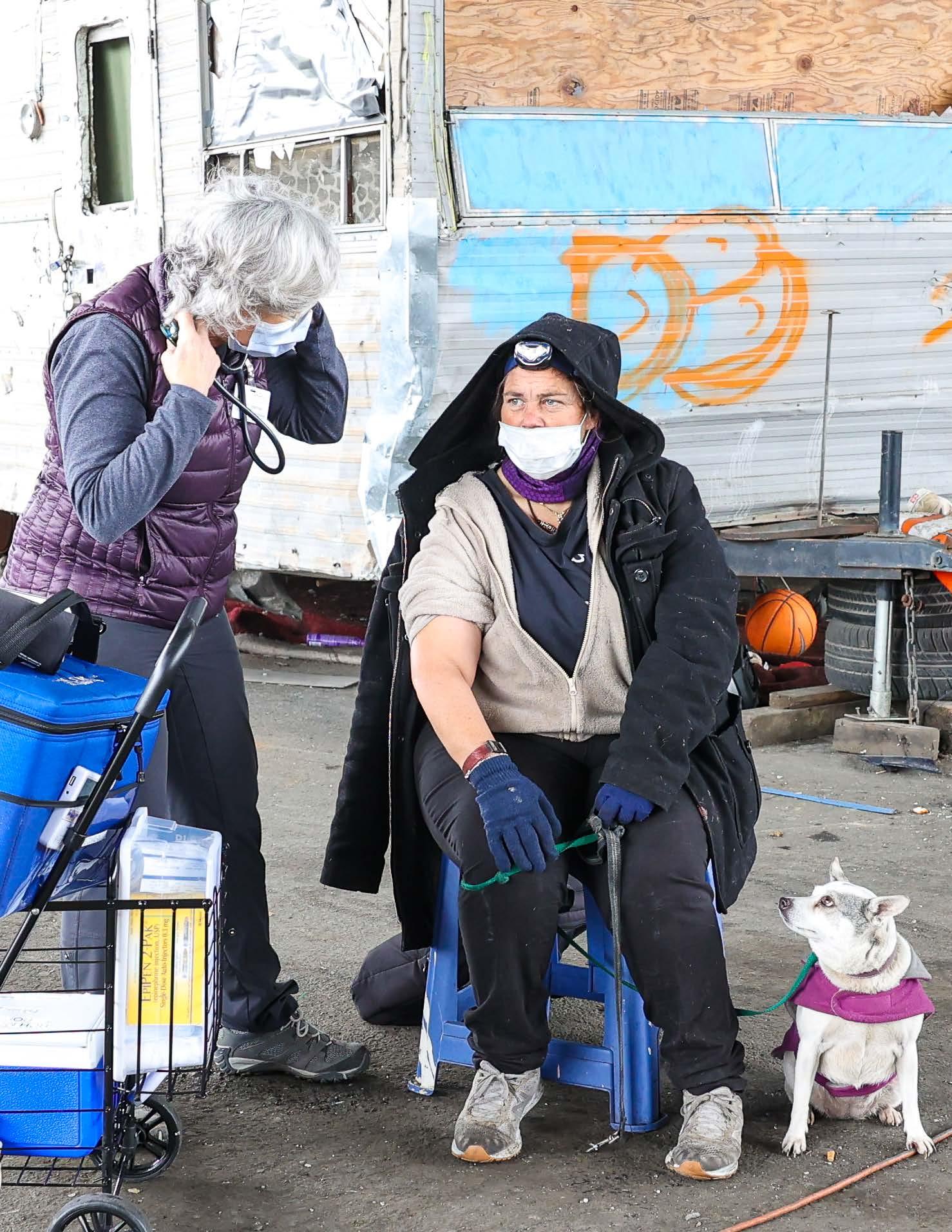
5 minute read
Compassion, Patience & Understanding Open the Door to Care for the Unhoused
Building a relationship is the first step to helping the county’s most vulnerable
Since middle school, voices in her head plagued Beth (pseudonym). Experiencing abuse as a child, the voices grew louder over the years, forcing Beth to isolate herself from family and communicate less and less. Regular wellness exams and care that most take for granted were out of reach for Beth and the people in the encampment where she lives; fear of judgment often the greatest barrier to that care.
Advertisement
Fortunately for Beth and others without stable housing, Contra Costa Health’s Health Care for the Homeless program bridges that gap and delivers essential medical and mental health care. Even more importantly for a population living on the fringe, this program delivers a level of compassion and understanding that has made the Health Care for the Homeless team welcome visitors to people experiencing homelessness.
“Homeless care is a long game,” says Heather Cedermaz, a family nurse practitioner and medical director of the program. “I think it’s about consistency, respect and building trust.”
Beth had been known to the team for years and lived on the streets during pregnancies with limited or no prenatal care. The voices and her mistrust of the medical establishment were barriers that made her pregnancies high risk, worrying the team. Because Beth did not make it to the hospital for all of her deliveries, every opportunity to build trust was essential for her health and that of her baby.
“She was very standoffish with our entire team and the first time I met her, she would not allow me near, almost running away to avoid an exam,” Heather explains. “Even without an exam, it was clear she was well into pregnancy and would deliver on the streets if we did not collaborate with city and county partners to bring her into care. This was my first encounter with her and I was concerned it meant we would never make the muchneeded connection for long-term health.”
Fortunately, working together with Contra Costa Health’s mobile crisis response team, the Health Care for the Homeless team helped get Beth admitted to a hospital where she safely delivered her child.
In the year following this delivery, Beth’s apprehension toward the Health Care for the Homeless team began to fade and her trust in Heather blossomed. As time went on, Beth continued to allow care intermittently.
“It’s humbling to be welcomed into their space,” Heather says. “They are in a vulnerable place when they invite us into their home, more so than we are going in. I think Beth gained something from each interaction with Health Care for the Homeless, but my bucket is definitely fuller than her bucket.”
Though still preoccupied with voices and distrustful of anyone outside of her peers, a bridge was being built, which allowed Heather and her team an opportunity to intervene earlier with Beth’s next pregnancy. Thanks to the relationship built during the previous year, Beth was receptive and allowed a test to confirm pregnancy as well as a clinical exam.
The Health Care for the Homeless team, working with Contra Costa Health’s Coordinated Outreach, Referral, Engagement (C.O.R.E.) program, behavioral health experts and the perinatal team discussed a plan to get Beth to the hospital to have her baby. But the night before the team hoped to get her to the hospital, Beth gave birth at the encampment. Friends called an ambulance to transport Beth and the child to a hospital, though Beth chose to leave alone within hours of arriving.
After the birth, Beth was hesitant to let Health Care for the Homeless team members talk to her at the encampment. However, when Heather, a recognized and trusted face arrived, Beth allowed for an examination. Though Beth was okay, Heather and the team acknowledged that if she were to become pregnant again, it could harm her health. Heather explained the concerns to Beth and told her there was safe, reversible medication to prevent pregnancy. Beth agreed to this immediately. Heather believed long-acting contraception could provide Beth more control over her body and hopefully decrease the added stress a pregnancy causes for many women experiencing homelessness.
Heather says the change in Beth since receiving the contraceptive was noticeable. “She’s been happier and even accepts hugs from me. It seems that the added control has improved her moods and opened the door for us to discuss and begin treatment for the voices.”
“It’s about unconditional care and love,” Heather says. “We could all go there and judge, but that’s not our job. Our job is to reduce risk with a harm-reduction model. That’s the goal and purpose of our safety net institution. Beth is our mission. If we’re not taking care of her, who are we taking care of?”
Though the arc of this story is years in the making, Heather feels that Beth’s story is that of countless women on the streets, each unique, but the same in so many ways.
“It’s about unconditional care and love,” Heather says. “We could all go there and judge, but that’s not our job. Our job is to reduce risk with a harm-reduction model. That’s the goal and purpose of our safety net institution. Beth is our mission. If we’re not taking care of her, who are we taking care of?”










